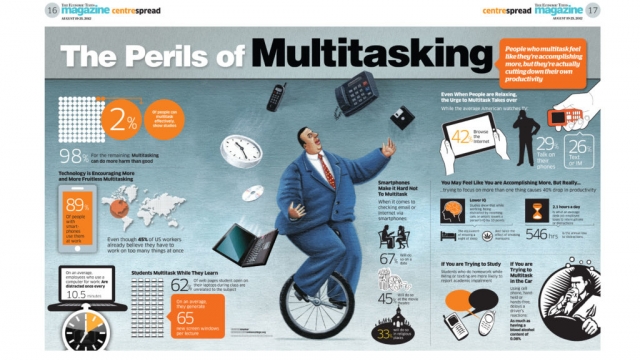by Kim Jimenez
Not that long ago “multitasking” was the only way to work and even live. Working on multiple tasks at once, jumping from one task to another in order to accomplish more in less time, or so we thought. Now, after years of eating lunch at your desk while working, checking emails while in an important meeting and barely hearing what your client is saying as you jot down notes about a separate big project you are working on, it has been determined that all this multitasking is actually doing us more harm than good. It has increased our stress levels, reduced our creativity and produced a lot of substandard results. Some of our multitasking has even become dangerous; texting as well as engaging in phone conversations while driving has been proven to be distracting at minimum and deadly at its worst.
According to Organizational Behavior (Schermerhorn/Osborn/Uhl-Bien/Hunt, 12th Edition) hi-tech young professionals are sometimes referred to as the “Elsewhere Class.” This is because “Elsewhere” is the place you are thinking about even when you are not there. Technology is the enabler of work preoccupation. It also states that “the Elsewhere Class face lots of stress in struggles to balance work, family and leisure.” Clifford Nass, a psychology professor at Stanford University, says today’s nonstop multitasking actually wastes more time than it saves—and he says there’s evidence it may be killing our concentration and creativity too. It can definitely be credited with troubled relationships, whether family, friend or co-worker. The current practice of checking emails and messages and even taking phone calls while with others at social, work or family events has made today’s “multitaskers” seem rude, insensitive, and dismissive. It is putting up a wall on personal interactions and has become a major issue in today’s society.
“Be where you are” is an increasingly common adage as of recent. It refers to being totally mindful of what you are doing at that moment, the people you are with at that moment. It encompasses putting that phone away and making eye contact with that person you are dining with, actively listening to your clients or coworkers, putting your total concentration into that work project you are working on right now, not being distracted by the next thing your are going to work on and finally not taking work with you and actually relaxing on vacation. In the February 3 issue of Time Magazine, the cover story was “The Mindful Revolution; The science of finding focus in a stressed-out, multitasking culture.” It states there are nearly 1,000 certified Mindfulness Based Stress Reduction instructors teaching mindfulness classes worldwide. We now need instructors, certified instructors, to help us focus and relax. Also it gives the suggestions of wearing a watch so you will not be tempted to check your phone for the time (um, guilty here!) and no phones in the bedroom so it is not the very first thing you pick up in the mornings (again, guilty).
While some see this as a minor issue, it is becoming more and more evident this trend has damaged our wellbeing. So, take this seriously and find out when and where you are “elsewhere”, take a look at your relationships with clients and vendors as well as family and friends to determine if they are healthy or distant. As an employer, this can affect the performance of your employees and that reflects on you. While some of this multitasking may not be avoided at “crunch time”, be sure to encourage your employees to get away from their desks at lunch, focus on the task at hand and make sure YOU are giving them time away from the job by not contacting them during their off hours whenever possible. Finding the right balance between work, family and leisure will give peace of mind and contentment which in many cases will translate to increased performance while at work.

